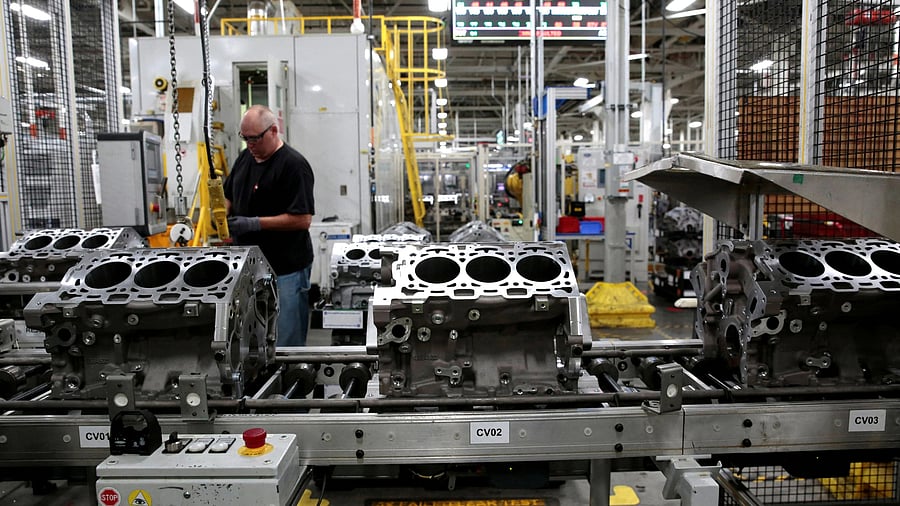
Engine casting blocks, used in a variety of General Motors cars, trucks and crossovers, move down the assembly line at the GM Romulus Powertrain plant in Romulus, Michigan, US.
Credit: Reuters Photo
The Trump administration's tariffs have raised manufacturing costs for the $50 billion US heavy-duty truck industry, prompting companies to consider sourcing more components from Mexico to benefit from concessions under the US-Mexico-Canada Agreement (USMCA).
US truck manufacturers currently face 50 per cent tariffs on imported steel, aluminum and copper derivatives under Section 232 of the Trade Expansion Act. In addition, manufacturers like Bellevue, Washington-based Paccar are hit with tariffs on every non-USMCA-compliant part they import.
Rivals including Daimler Truck and Traton sidestep these levies by building in Mexico, giving them an edge on costs over companies that are manufacturing in the US.
The USMCA pact allows goods to move duty-free between the US, Mexico and Canada, provided they meet certain regional sourcing rules. Under the pact, at least 64 per cent of a heavy truck's value must originate in North America, via parts like engines and axles, raw materials such as steel or assembly labor. That threshold will rise to 70 per cent in 2027.
Sweden's Volvo and its subsidiary Mack Trucks produce their vehicles for the US market domestically at their plants in Dublin, Virginia and Macungie, Pennsylvania, respectively.
"Trucks built in the US are actually disadvantaged today compared to trucks built in Mexico," a spokesperson at Volvo's North American unit said.
In April, the company boosted its planned Mexico plant investment by $300 million to $1 billion, aiming to support its US operations.
Tariffs on imported components put trucks assembled in the US at a 3 per cent cost premium compared with USMCA-compliant models built in Mexico, brokerage Bernstein said.
"Companies with a higher manufacturing footprint in the US than in Mexico are at a relative cost disadvantage and this is the complete antithesis of what the Trump administration wants," said Chad Dillard, senior analyst, Bernstein.
ACT Research forecast production to dip 11 per cent year-on-year in 2026 to 226,600 units, with economic headwinds and weaker carrier profitability having hit the industry in 2025.
Paccar, which sells trucks under the Kenworth and Peterbilt brands, estimates $75 million in tariff costs in the third quarter. The company said its brands held a 30.4 per cent market share in the first half of 2025.
Daimler's first-quarter gross margin of 21.96 per cent was higher than Paccar's 18.69 per cent.
Paccar declined to comment for this story. CEO Preston Feight said in a recent earnings call that the company was working with suppliers to boost USMCA-certified parts imports to cut long-term tariff exposure.
Tariffs add an estimated 2 per cent to 4 per cent to per-unit costs, according to ACT Research. Daimler's Mexican built Freightliner Cascadia is priced at about $165,000 versus roughly $195,000 for Paccar's comparable Kenworth T680.
Raw materials, castings and finished components make up roughly 85 per cent of the cost of building a truck.
Munich-based Traton, which operates subsidiary International Motors formerly known as Navistar for the North American market, told Reuters that the USMCA enables it to qualify most finished trucks for duty-free access to the US market.
"This can offer a structural cost advantage versus US production in cases where US plants rely on imported steel, aluminum, or components subject to Section 232 or other additional tariffs," the Volkswagen-owned company said in a statement to Reuters.
A Daimler Truck spokesperson told Reuters the company operates two USMCA compliant plants in Mexico producing a range of models including the Freightliner Cascadia Class 8 truck and the medium-duty Freightliner M2 truck.
The US heavy-duty truck market, valued at $51.56 billion, is projected to reach $71.81 billion by 2030, according to Mordor Intelligence.
The US Commerce Department, in April, began a Section 232 probe to determine if imports of medium- and heavy-duty trucks and parts threaten national security.
The probe could lead to new tariffs or exemptions, reshaping cost dynamics for truck manufacturers and discouraging production shifts overseas, experts said.